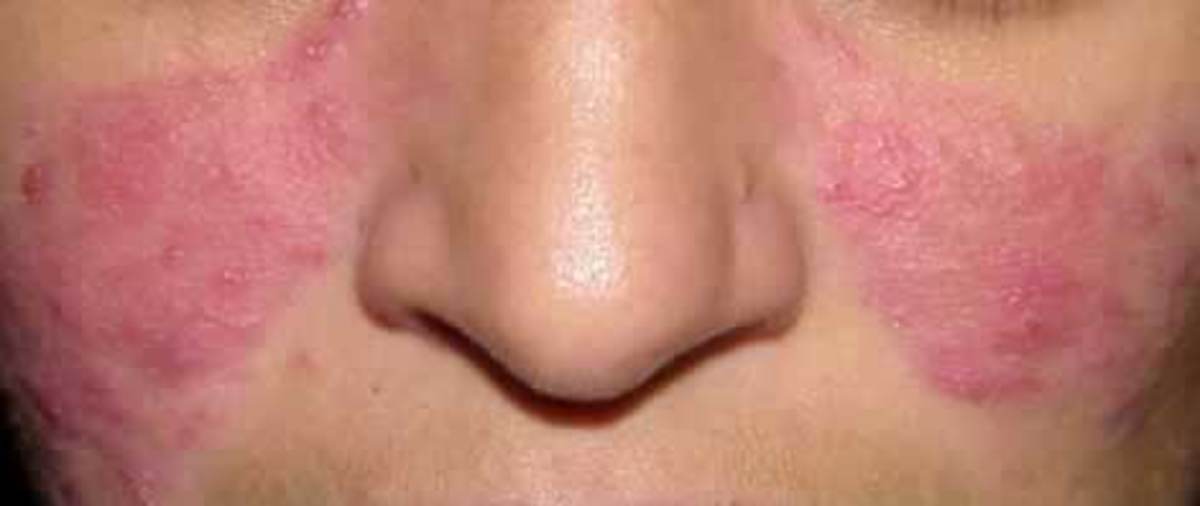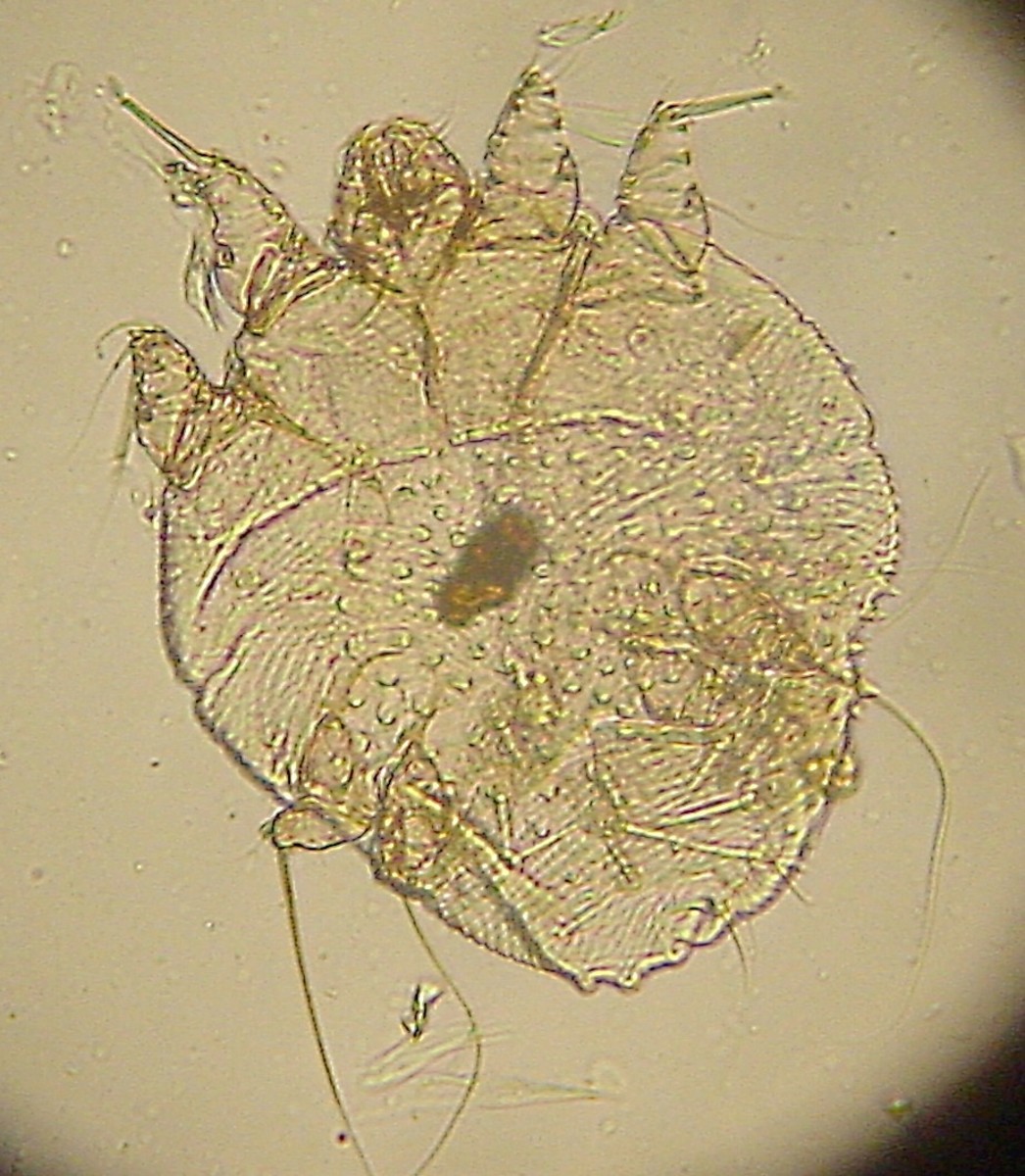What Causes Rosacea?
What is Rosacea?
Rosacea is a chronic skin condition characterized by redness (often on the face). There are different subtypes of rosacea as shown in rosacea.org. Besides redness (subtype 1), some may have papulopustular pimples (subtype 2), skin thickening (subtype 3), and eye irritation (subtype 4) -- or a combination.
We do not know what causes rosacea. But clues and hypothesis can be found in books and on the Internet.
Depending on the severity, minor rosacea is harmless and may not require treatment. While more severe cases do. Medicinenet.com has a comprehensive article on rocacea and says that rosacea is "a common, chronic, incurable, adult acne-like skin condition". "Incurable" may not be accurate, as there have been reports that people can get better from rosacea.
Although the exact cause of rosacea is unknown, there are several popular theories. Some of which are as follows.
Demodex Skin Mites?
Skin mites known as Demodex lives on 20% to 80% of adults, and perhaps in 100% of the elderly as individuals pick them up with time. These mites feeds on the oily sebum secreted by the skin.
Although they are originally thought to be harmless, WebMd says that people with rosacea have 10 times as much mites as typical individuals. The mites carry bacteria and they might be thriving due to possible changes in the immunological conditions of the host or changes in the skin environment. For example, higher mite counts have been found in patients taking immunosuppressive therapies. And higher mite counts have been found in individuals producing sebum of altered fatty acid compositions.
The Journal of Medical Microbiology has article stating ...
"These findings raise the possibility that rosacea is fundamentally a bacterial disease resulting from the over proliferation of Demodex mites living in skin damaged as a result of adverse weathering, age or the production of sebum with an altered fatty acid content."
But it does note that additional factors may include ...
"Possible factors responsible for rosacea may include autoimmune dysregulation, vascular disorders, external factors, degeneration of connective tissue elements, functional disorders of the pilosebaceous unit, nutritional and chemical factors and infectious factors"
David Pascoe of rosacea-support.org writes of several ways to rid Demodex mites.
Although not all cases of rosacea is related to Demodex mite. There are at least some cases that are caused by Demodex. Demodectic rosacea is rosacea that is caused by Demodex mites or rosacea that reduces as a result of treating Demodex.
Article on Demodectic Rosacea has links to many references relating Demodex and rosacea, as well as possible treatment.
Does H. Pylori Causes Rosacea?
Some say yes, and others say no.
Although more than half the population harbor Helicobacter pylori in the upper gastrointestinal tract, 80% of them shows no symptoms. For others, H. pylori causes stomach ulcers. Some are saying that the people with rosacea have higher incidence of H. pylori. It is suspected that the bacteria releases a toxin that causes the inflammation of rosacea.
Others found that when H. pylori is treated with antibiotics, rosacea improves. Often the prescription antibiotic metronidazole is used to treat rosacea. Side effect of this drug may include nausea, diarrhea, and metallic taste in the mouth. High doses or long-term use may affect the central nervous system (such as nerves and brain) and decrease white blood cell count. Metronidazole is a possible carcinogen. The antibiotic Metronidazole that is used to treat rosacea may also work to treat H. pylori.
For a more natural remedy, green tea, red wine, broccoli sprouts, garlic, probiotics and flavonoids may help prevent H. pylori colonization.[3] And supplementing with Lactobacillus and Bifidobacterium may also help.[reference]
SCTE and cathelicidin?
University of California San Diego researchers believed that rosacea is the result of elevated levels of enzymes called stratum corneum tryptic enzymes (SCTE) and cathelicidin.[reference]
Rosacea.org also says that a possible cause of rosacea is ...
"immune response triggered by a type of antimicrobial protein known as cathelicidin"
But wikipedia says that cathelicidins serve a critical role in mammalian innate immune defense against invasive bacterial infection. However, it seems that people with rosacea have way too much of it.
USMedicine.com reports that people with rosacea has 100 times more cathelicidin than normal. Article also has a nice graph of some flare-up triggers of rosacea (sun exposure being a top one).
ClinicalKey.com suggests that abnormal cathelicidin may be due to hyperactive innate immune response. Other common causes of rosacea that it lists are dermal matrix degeneration and underlying vasomotor instability.
Diet and Rosacea?
TheFoodPsychologist.com reports that diet can be a factor. This can be nutritional deficiencies (such as vitamin B), and low stomach acid or digestive enzymes, and food sensitivities For example, some people with rosacea has low levels of the pancreatic enzyme lipase that helps digest fats.
Interestingly, there is a blog post the provides 9 "Natural Treatments of Rosacea". Among them are B vitamin treatment and digestive enzyme treatment -- which provides support for the above theory. It also mentions food intolerances, which we will talk about next.
Food Intolerances?
Food intolerances or sensitivity can cause inflammation.
One way to determine if there is food intolerance is an elimination and challenge cycle where you eliminate all possible trigger foods and add them back one at a time to see if one of these foods is a problem food for you. According to the book The Virgin Diet: Drop 7 Foods, Lose 7 Pounds, Just 7 Days, the seven most problematic foods are gluten, dairy, soy, corn, eggs, peanuts, sugar and artificial sweetener (not listed in any particular order).
Another way is to run food sensitivity test such as the one provided by Cyrex Labs.
Gut Health Affects Skin
Skin is affected by gut health. Leyla Muedin, MS, RD, CDN writes that ...
"Acne and rosacea, both inflammatory conditions, are aggravated by poor diet which can suppress the immune system and set the stage for the overgrowth of opportunistic bacteria in the gut causing leaky gut syndrome. High sugar and refined carbohydrate intake coupled with stressful lifestyles often contribute to the bacterial overgrowth in the gut which is often the culprit in breakouts and flare-ups. Acne is primarily caused by overactive sebaceous (oil) glands" [reference]
and that elminating dairy foods may resolve acne.
Others write that for people with rosacea ...
"Friendly flora that are involved with detoxification and that prevent the overgrowth of infectious bacteria are often depleted"[reference]
Elizabeth Lipski writes that...
"I have seen remarkable improvements in my clients on a gluten-free diet and also with the use of betaine HCl to increase stomach acids." [page 397 of 4th edition of Digestive Wellness]
SIBO (small intestinal bacterial overgrowth) is associated with low hydrochloric acid (HCl). A study found that treating SIBO with rifaximin therapy helps with rosacea.
Candida have also been linked with rosacea.
The book Digestive Wellness suggests digestive enzymes (with lots of fat-splitting enzymes) and probiotics.
Omega-6 and Omega-3 Balance
Omega-6 fatty acid and Omega-3 fatty acids are both essential, but they must be balanced. In a diet of highly processed and deep fried foods, there is an over abundance of omega-6 and not enough omega-3.
Omega-6 is inflammatory. And omega-3 is anti-inflammatory. Chris Kresser writes that ...
"This high ratio of omega-6 to omega-3 fatty acids in our modern diet likely plays a role in the prevalence of inflammatory skin conditions such as acne, psoriasis, and rosacea."[reference]
So one can try decreasing omega-6 and adding in more healthy omega-3 to see if that helps with rosacea.
However, not all omega-6 are bad. Ironically, Dr. Ann Louise writes ...
"The surest way I’ve found to treat rosacea in my clinical practice? The anti-inflammatory omega-6 fat, gamma linoleic acid (GLA) works as well for rosacea as it does for eczema and other allergic skin reactions."
She also believes that food sensitivities is a likely cause of rosacea.
More factors
Other factors include genetic predisposition to rosacea. There have also been mention of stress.
Other references found are ...
"Several hypotheses have been documented in the literature and include potential roles for vascular abnormalities, dermal matrix degeneration, environmental factors, and microorganisms such as Demodex folliculorum and Helicobacter pylori." [reference]
Other References:
- [1] Does H. Pylori Cause Rosacea? - Rosacea Center - EverydayHealth.com
Does H. Pylori Cause Rosacea? - Everyday Health: What role, if any, does H. - [2] Metronidazole - Wikipedia
- [3] Helicobacter pylori - Wikipedia









